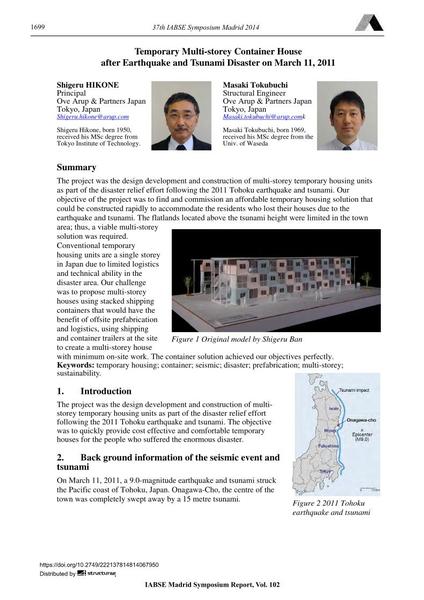Temporary Multi-storey Container House

|
|
|||||||||||
Bibliografische Angaben
| Autor(en): |
Shigeru Hikone
Masaki Tokubuchi |
||||
|---|---|---|---|---|---|
| Medium: | Tagungsbeitrag | ||||
| Sprache(n): | Englisch | ||||
| Tagung: | IABSE Symposium: Engineering for Progress, Nature and People, Madrid, Spain, 3-5 September 2014 | ||||
| Veröffentlicht in: | IABSE Symposium Madrid 2014 | ||||
|
|||||
| Seite(n): | 1699-1706 | ||||
| Anzahl der Seiten (im PDF): | 8 | ||||
| Jahr: | 2014 | ||||
| DOI: | 10.2749/222137814814067950 | ||||
| Abstrakt: |
The project was the design development and construction of multi-storey temporary housing units as part of the disaster relief effort following the 2011 Tohoku earthquake and tsunami. Our objective of the project was to find and commission an affordable temporary housing solution that could be constructed rapidly to accommodate the residents who lost their houses due to the earthquake and tsunami. The flatlands located above the tsunami height were limited in the town area; thus, a viable multi-storey solution was required. Conventional temporary housing units are a single storey in Japan due to limited logistics and technical ability in the disaster area. Our challenge was to propose multi-storey houses using stacked shipping containers that would have the benefit of offsite prefabrication and logistics, using shipping and container trailers at the site to create a multi-storey house Figure 1 Original model by Shigeru Ban |
||||
| Stichwörter: |
Nachhaltigkeit Vorfertigung
|
||||
